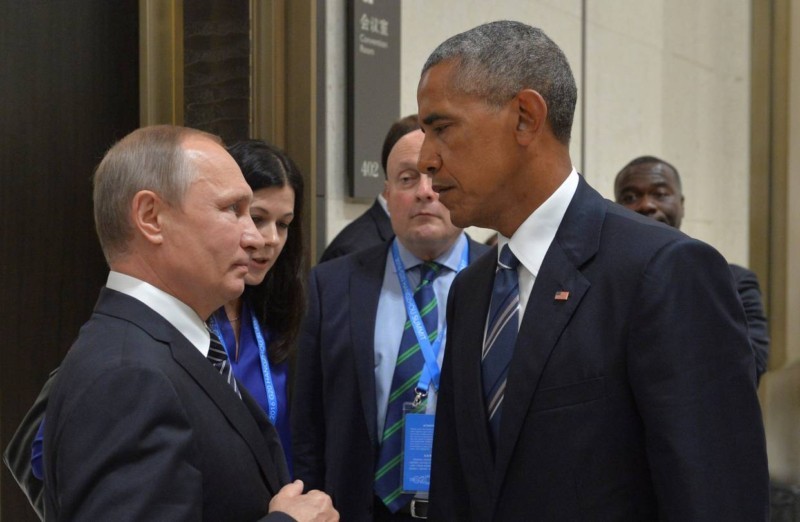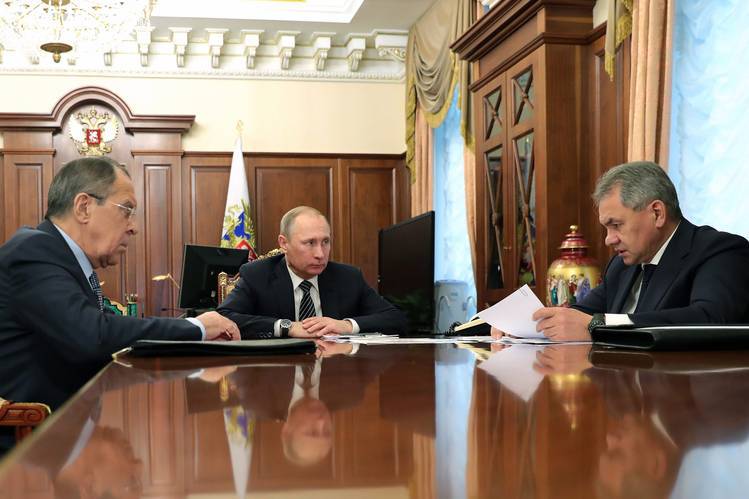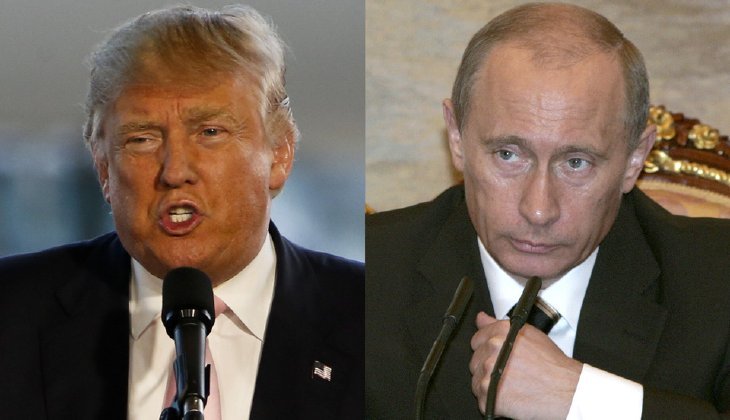
Russian dictator Vladimir Putin met with President Barack Obama on the sidelines of the G-20 Summit in Hangzhou, China in September 2016.
On December 30, 2016, Carol E. Lee and Paul Sonne wrote an article titled “Obama Sanctions Russia, Expels 35” which was published in the Wall Street Journal. The reporters explained that President Barack Obama retaliated against Russia’s alleged use of cyber-attacks to interfere with the 2016 presidential election. The president imposed sanctions on Russian agencies and companies and expelled 35 suspected intelligence operatives from the United States in one of the greatest diplomatic confrontations between Washington and Moscow since the end of the Cold War. Russia threatened to retaliate and then changed its mind, while members of Congress asked for even stiffer sanctions and an investigation into Moscow’s cyber-attacks.
President Obama said the cyber-attacks “could only have been directed by the highest levels of the Russian government.” He said, “We will continue to take a variety of actions at a time and place of our choosing, some of which will not be publicized.”
Russia has continued to deny its involvement in the election-related hacks. Russian government spokesman Dmitry Peskov said, “the principle of reciprocity applies here.” Peskov stated that Russian President Vladimir Putin would formulate a response that would create “considerable discomfort in the same areas” for the United States. As it has been indicated, Russia decided not to respond to America’s sanctions. President-elect Donald Trump said he will review the situation next week in a meeting with U.S. intelligence officials.

Russian Foreign Minister Sergei Lavrov, left, meets with President Vladimir Putin, center, and Defense Minister Sergei Shoigu at the Kremlin in Moscow on December 29, 2016.
Lee and Sonne explained the following: “The sanctions target Russia’s military intelligence agency, the Main Intelligence Directorate, or GRU, for tampering, altering or causing the misappropriation of information” with the purpose or effect of interfering with the election. The measures also cite Russia’s main security agency, the Federal Security Service, for assisting the GRU in the activities. Also sanctioned were three Russian companies the administration accused of providing material support for the GRU’s cyber operations and four top Russian officials who run the military intelligence agency.” The sanctions impose asset freezes and travel bans on individuals and prohibit U.S. citizens and companies from doing business with them.
The State Department expelled 35 intelligence agents allegedly serving as diplomats from the Russian embassy in Washington, D.C. and the Russian consulate in San Francisco. The Russian officials and their families were given 72 hours to leave America after the State Department said they “were acting in a manner inconsistent with their diplomatic status.”
The State Department informed Russia that, as of December 30, 2016, it would deny access to two Russian government-owned compounds in the United States. One is a summer retreat for Russian embassy officials on the eastern shore of Maryland and the other is a compound for Russian diplomats on Long Island, New York. The White House accused Moscow of using the recreational compounds for intelligence-related purposes.
Lee and Sonne said that the Department of Homeland Security and the FBI issued a joint report, titled “Grizzly Steppe,” giving additional technical details about the election hacking, including implicated IP addresses, virus signatures, and file hashes. The report indicated that the hacking group known as Cozy Bear, or APT 29, penetrated the network of an American political party in the summer 2016, while a second group known as Fancy Bear, or APT 28, penetrated the network in the spring 2016. It said Russian intelligence actors gained access and stole content from senior party members. The report warned that individuals associated with Russian intelligence were launching spear phishing campaigns even after the election. Many Republicans in Congress said President Obama had taken too long to punish Russia after years of Russian aggression. Senate Majority Leader Mitch McConnell (Republican from Kentucky) said the next Congress should take tougher actions. Senate Democrats praised the Obama administration’s decision to target new Russian officials and entities with sanctions.
On December 29, 2016, President-elect Donald J. Trump, who had said a day earlier that “we ought to get on with our lives” when asked about retaliatory moves against Russia—appeared open to accepting the U.S. intelligence assessment. President-elect Donald J. Trump stated the following: “It’s time for our country to move on to bigger and better things. Nevertheless, in the interest of our country and its great people, I will meet with leaders of the intelligence community next week in order to be updated on the facts of this situation.”
Is there conclusive evidence that Russia used cyber-attacks to interfere with the 2016 presidential election?
Cliff Kincaid wrote an article titled “Obama’s Evidence Against Russia Falls Flat” which was published on the Accuracy in Media website on December 30, 2016. Kincaid explained that Obama and Democrats have been stating that there is proof that Russia hacked into Democratic Party computers for the purpose of obtaining and planting information that would help elect Donald J. Trump as president. But the reporter said that proof was not provided when President Obama issued an executive order and announced the expulsions of 35 Russians from America and sanctions against Russian officials. President-elect Donald J. Trump seemed in no hurry to come to any rash conclusions, saying he would meet with “leaders of the intelligence community” next week in order to be “updated on the facts of this situation.”
Kincaid pointed out that the Obama administration’s Joint Analysis Report on alleged “Russian malicious cyber activity” is very weak and vague in key respects. The reporter stated the following: “It would have been nice if reporters had read the pathetically thin report before concluding that there was substance to it, and that Trump was somehow derelict in not accepting what Obama had to offer. Only four-and-a-half pages of the 13-page report purport to examine alleged Russian hacking activities. The rest of the report gives advice on how to provide security for computer networks. It looked like the report was padded in order to make it seem more authoritative than it really was. A separate White House press release went into some more detail, alleging that “the disclosures of alleged hacked e-mails on sites like DCLeaks.com and WikiLeaks are consistent with the Russian-directed efforts.” But being “consistent with” is not proof.”
Kincaid said that the Joint Analysis Report described as “the result of analytic efforts between the Department of Homeland Security (DHS) and the Federal Bureau of Investigation (FBI),” includes a “DISCLAIMER” stating that it is “for informational purposes only,” and that the DHS “does not provide any warranties of any kind regarding any information contained within.” The reporter said that “It sounded like the kind of warning that comes with a possibly defective product.” The report stated that this alleged Russian campaign, designated as “GRIZZLY STEPPE,” was an activity by Russian civilian and military intelligence services and was “part of an ongoing campaign of cyber-enabled operations directed at the U.S. government and private sector entities.” Kincaid explained that if it was ongoing, why did it take so long for Obama to take action? The reporter concluded his article by saying that Obama’s “evidence” raises questions about the worth and value of the intelligence agencies that apparently provided it. No wonder Trump wants to wait and see.
In a surprise decision Vladimir Putin said Russia will not retaliate against America

Vladimir Putin said Russia will not expel any American diplomats in response to the Obama administration’s executive order sanctioning Moscow over alleged interference with the 2016 presidential election. It is believed that Putin’s unexpected decision was designed to repair relations with America under President-elect Donald J. Trump. Putin stated, “We will formulate further steps in restoring Russian-American relations according to the policy that the administration of President Donald Trump conducts.”
President-elect Donald J. Trump said on Twitter that Putin’s decision not to respond to Obama’s sanctions was a “Great move. I always knew he was very smart! ”
Conclusion
The Obama administration has failed to protect America for the last eight years from cyber-attacks from Russia, China, North Korea, and other enemy nations. Many Republicans in Congress said President Obama had taken too long to punish Russia after years of Russian aggression. It is quite late for Obama to act tough as he has been a weak leader and has made America a superpower in complete retreat. Thanks to Obama’s foreign policy America’s enemies have been emboldened and do not fear America and its allies do not trust America to defend them. Just look at the shameful stab in the back that Obama did to America’s ally, Israel at the United Nations.
The editorial from the Wall Street Journal of December 30, 2016 pointed out the following: “Obama’s timid responses so far to Moscow—and to attacks from China and North Korea—have emboldened its hackers to meddle in the U.S. political process. The Russian regime is nothing if not a respecter of power, and only a U.S. President willing to exercise it will get the Kremlin to stop…On December 29, the transition released a more considered statement from Mr. Trump repeating that it’s time to move on but that in the interest of our country he’d meet with U.S. intelligence officials next week in order to be updated on the facts of this situation. He’s wise to do so lest Mr. Putin treat him as a cyber-patsy the way he has Mr. Obama.”
President-elect Donald J. Trump and his advisers need to study carefully the Joint Analysis Report titled “Grizzly Steppe” issued by the Department of Homeland Security (DHS) and the Federal Bureau of Investigation (FBI) to determine its accuracy. If Russia was involved then some type of action will be required. If the evidence is weak and inconclusive, then it is time to move on.
This writer believes that Russia is America’s number one geopolitical enemy. President-elect Donald J. Trump should try to develop a better relation with Moscow but he needs to be very firm with that nation’s dictator Vladimir Putin. Russia wants to recreate the old Soviet Union and has threatened America and its NATO allies with nuclear war.
Frank de Varona is an educator, historian, journalist, and internationally known expert on politics, economics, foreign affairs and national security issues. He was born in Cuba and, at the age of 17, he participated on the Bay of Pigs invasion in an effort to eradicate communism in Cuba. After spending two years in prison, he returned to the United States, where he earned three college degrees. He is married to Dr. Haydée Prado, a clinical psychologist, and has a daughter Irene and a grandson Danny. Professor de Varona had a 36-year career in the Miami-Dade County Public Schools as a social studies teacher, principal, region director, region superintendent, associate superintendent of instruction and interim deputy superintedent of schools. He also was an associate professor of social studies in the College of Education at Florida International Education for seven years. Professor de Varona has written 22 books and over 400 hundred articles in newspapers and magazines. His most recent book is entitled – The Gathering Threat of Russia, China, and Their Allies to America (2016) – Frank de Varona is a Director of Bear Witness Central in the Miami-Dade area.
